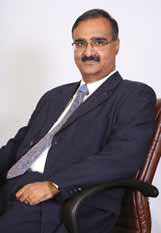
R. Balasundaram, Vice President, TATA AIG General Insurance, spoke about liabilities as the dynamics of business, stressing on the need for a balanced approach in identifying and managing risk, which is an important aspect of business. He also spoke of his professional life, challenges faced, while also touching upon his personal world
I am a Chartered Accountant and Company Secretary, and fellow member of the Insurance Institute of India. I worked in the insurance sector at the United India Insurance in Mumbai, went south and came back to Mumbai. I switched over to the private sector and joined Reliance, later moved on to join TATA AIG in 2003 in the marine division. In 2006, I moved to head the marine division. Recently, I moved to a new and larger position as the vice president of broker relations at TATA AIG General Insurance. When I joined the industry, I was 22 years, old. Being in the public sector was tough, especially when you have to make people work but it was a very good learning ground.
Today there are two main challenges. Profitability is coming down and loss ratio has increased because many competitors are coming in. The second is that the investment is also quite low. The biggest challenge is lack of adequate talent that is coming in because there is no glamour associated with this sector. Again, managing talent is quite a serious problem. In the insurance sector, it is important to keep learning on a regular basis.
Private players tend to be choosy. People are now beginning to trust private companies for insurance. If you see, private players are quick in delivery. Yes, in some places, people still trust public sector companies for insurance. Every player today has his own customer pockets.
According to the norms of IRDA, insurance companies should do about seven percent business in rural areas. However, you cannot expect huge profits there. It has own its own challenges.
People tend to confuse risk management with insurance. In fact, management of risk is not all about insurance. Insurance is just one of the components of risk management. You also have to manage the portion of the risk you have, to take safety measures. There are different parameters of business in a Volatility, uncertainty, complexity and ambiguity (VUCA) world. The risk will remain and the management of this risk is the key in such an environment; which can be done with understanding. Risk management is a balanced approach. We need to identify the risk, evaluate the risk.
There can be incidents like explosions, accidents, theft, damage of property, and so on. Here insurance can reduce the liability. What is the liability for a company? It could be the condition in which work is done. For any corporate, the liability may arise from anywhere or any person or user or regulator.
The penetration in developing countries is low compared with the GDP. In developed countries like the US or UK, it is being done through a broker and it is a totally different thing. India is an evolving market and we have a long way to go.
“Managing talent is quite a serious problem. Private companies are picking fresh graduates and training them for the job.”
Well, you need to push your technology, talent, government policy and funds; all should go hand in hand. There is need for ease of doing business. Today, FDI in the insurance sector has been increased up to 49 percent in India, as per the commitment at an international level.
You can’t wish it away and people are more and more aware about their rights. For example, if someone bought a car and there was a defect and he filed a complaint against the director, the company comes to the negotiating table. There is a question of accountability.
There are many opportunities. There are management programmes with insurance as a subject. Today, private sector companies are picking up fresh graduates and training them for the job. The private sector as an industry has a market.
Hacking can take place even when you have firewalls and other measures. People can go to any extent do such things. But at the same time you can’t avoid cyber use. Otherwise you may be out of business. In today’s cyber world, the world has come closer. But the liability has also increased. There is huge data that is online and any harmful activity like hacking or manipulation may create problems, as the data can be compromised. Such incidents can take a company out of business. Therefore, companies have to look at the liability. Once you have identified potential liability areas, then you can go further.
Yes, they should take it seriously as any such incident can take them out of business. Insurance liability covers can be taken for products of the company. In every business there are risks.
My wife is a post-graduate in commerce. I have two daughters. My elder daughter has a passion for teaching. She works with an international school and is married. My second daughter has done her BBA, and is keen on further studies.
I do a lot of writing, play Sudoku and I’m also active on the social media platform. I also like to play sports and teaching. I also enjoy travelling.
They should first manage themselves before managing organizations. There are two ways to go ahead -- one is by switching jobs and other one is working for the same company. But in both the cases, one should work hard.
By Mukul Potdar